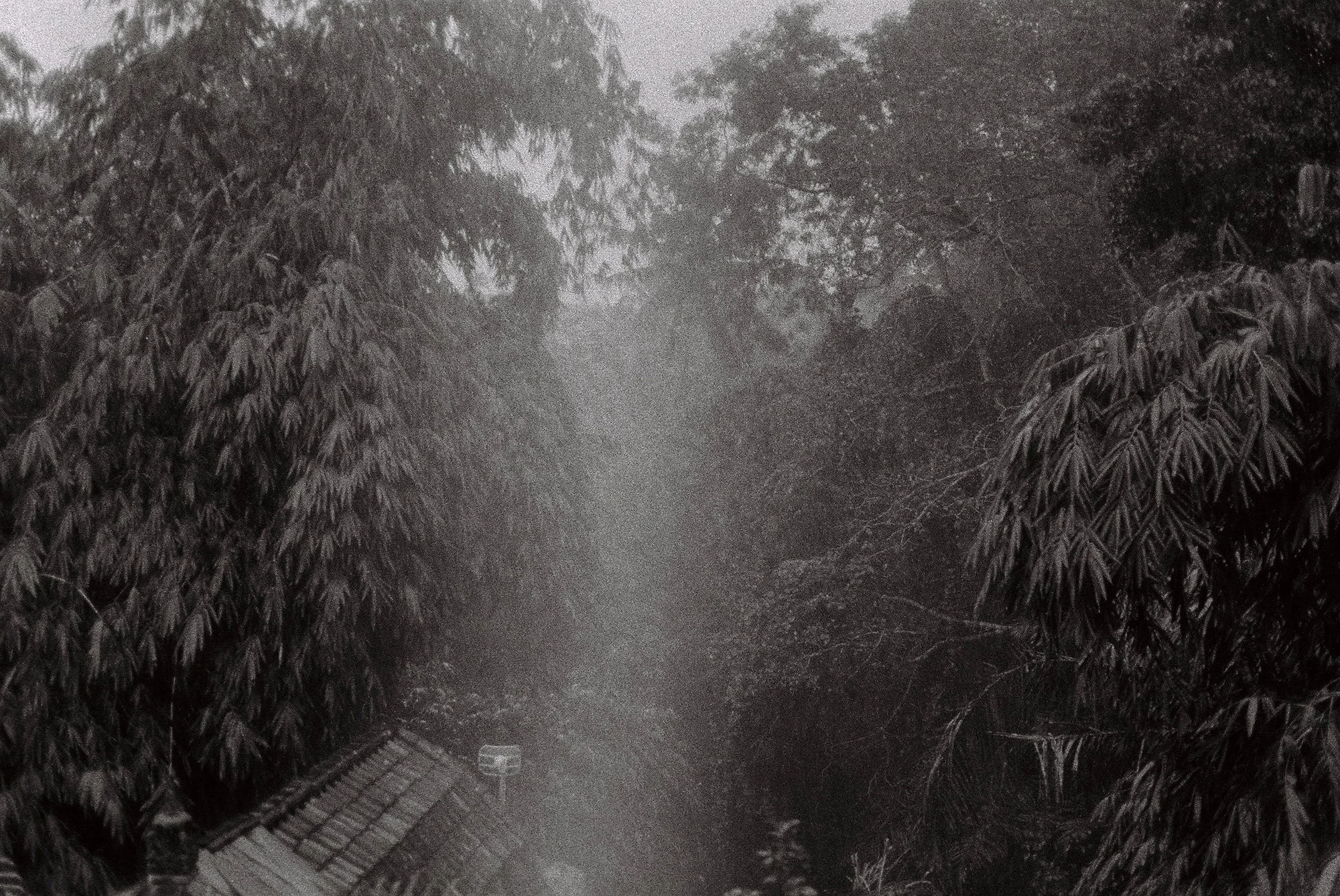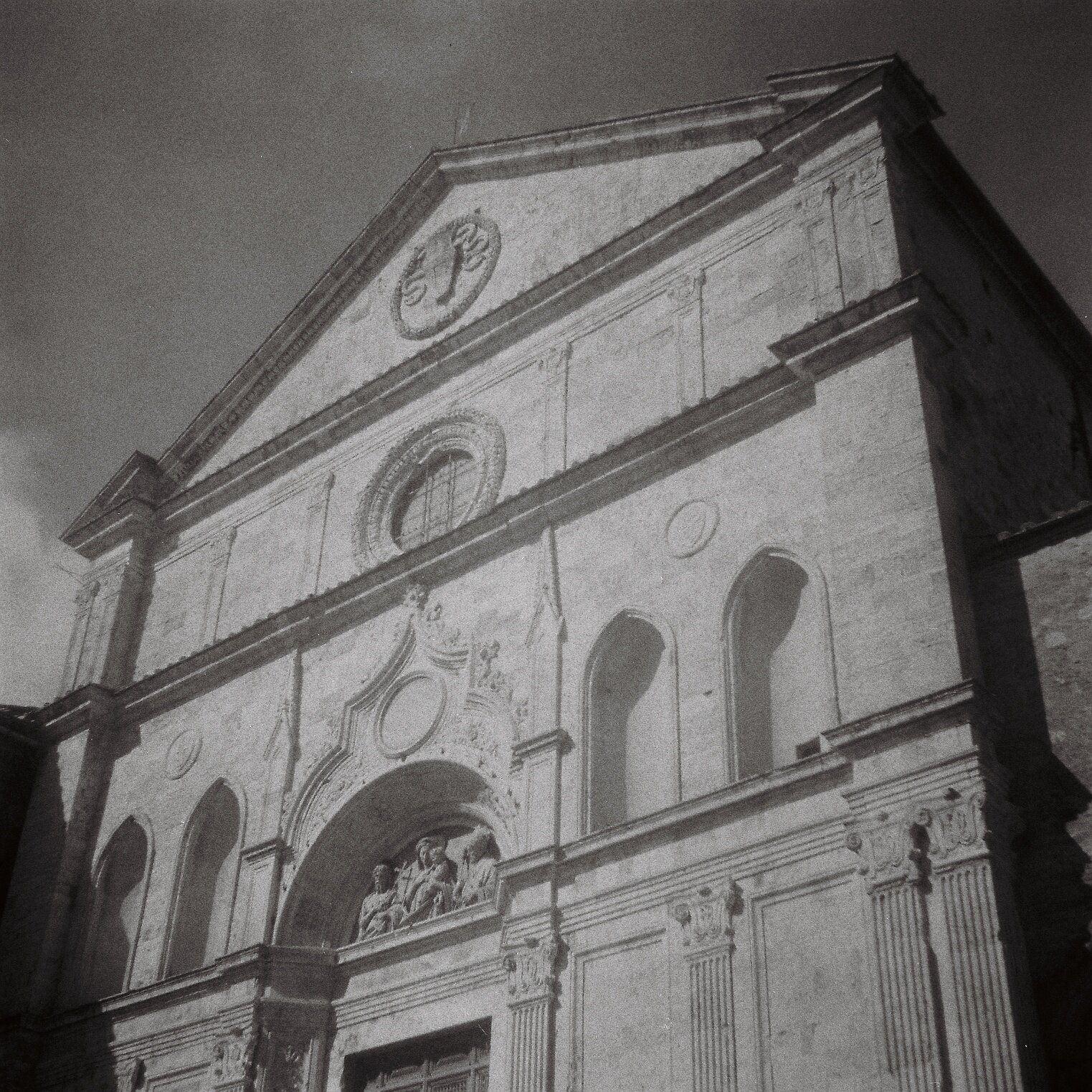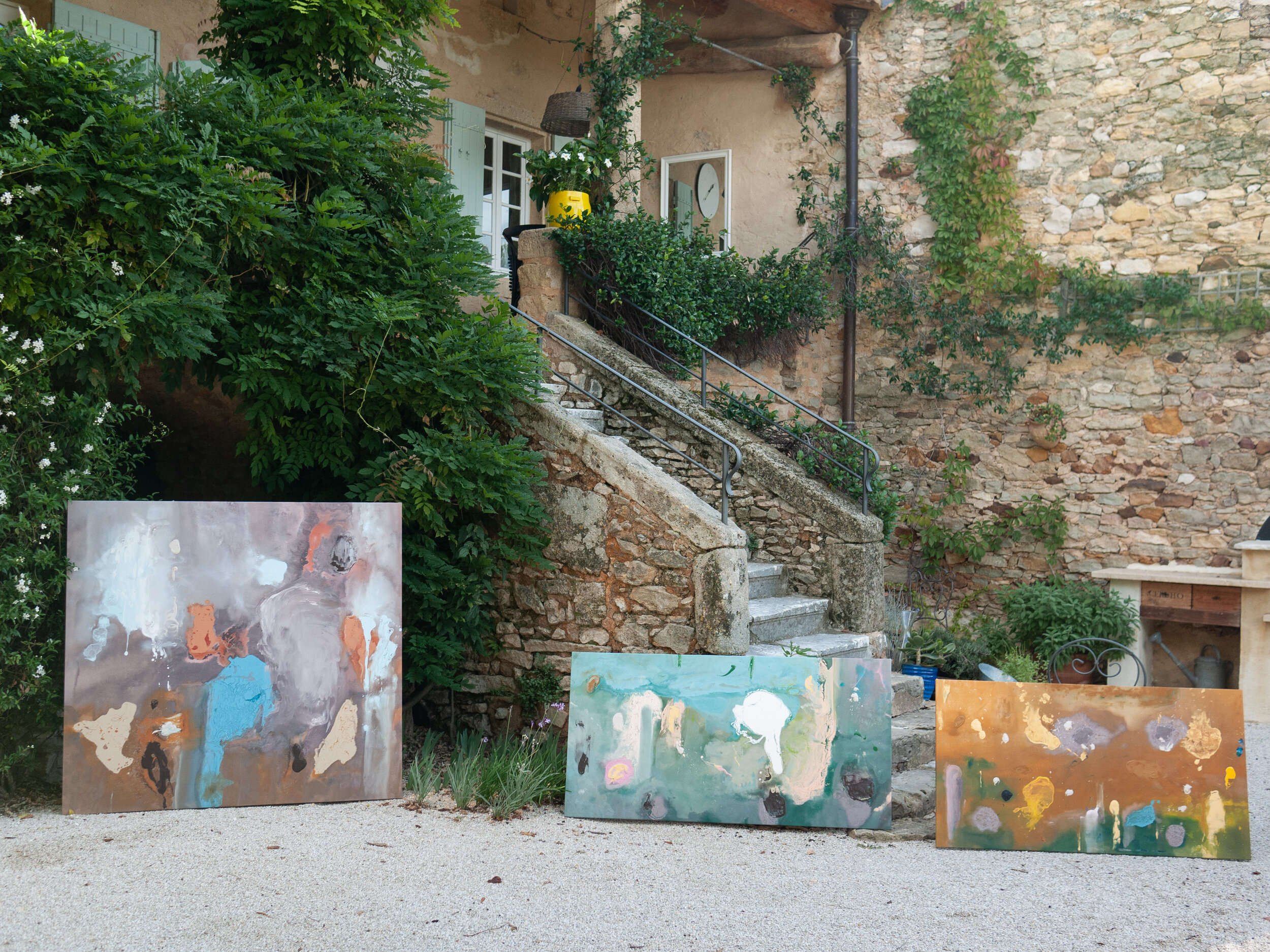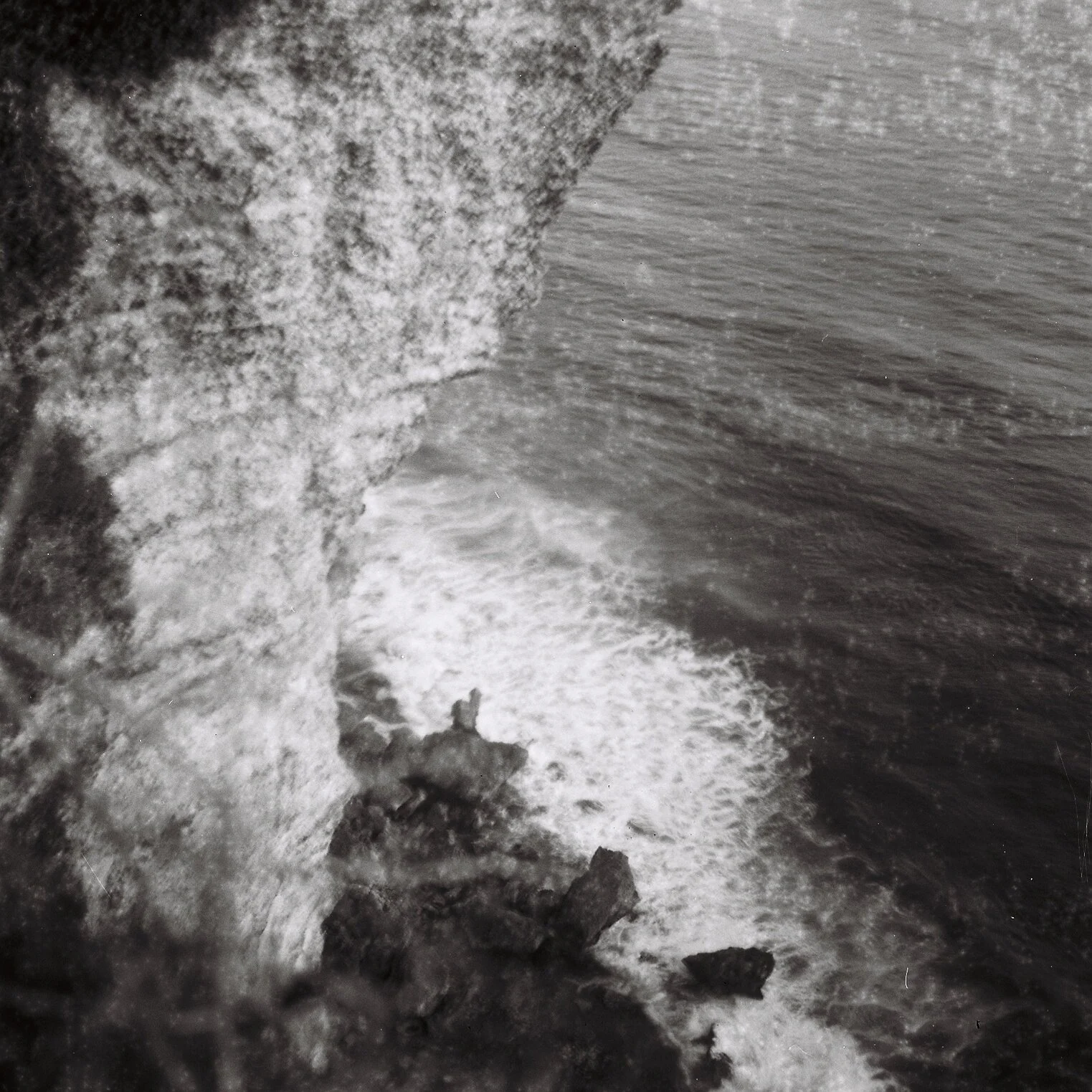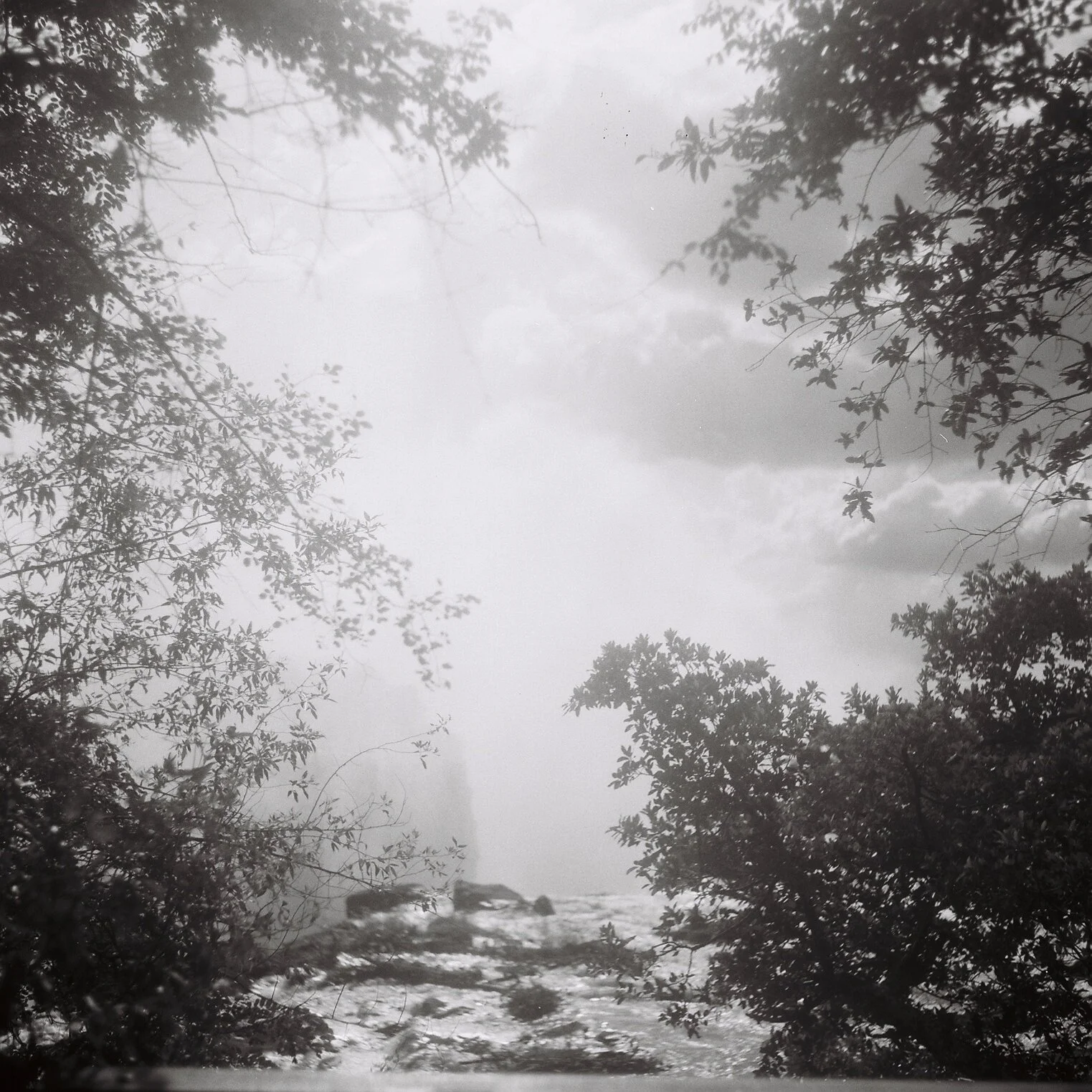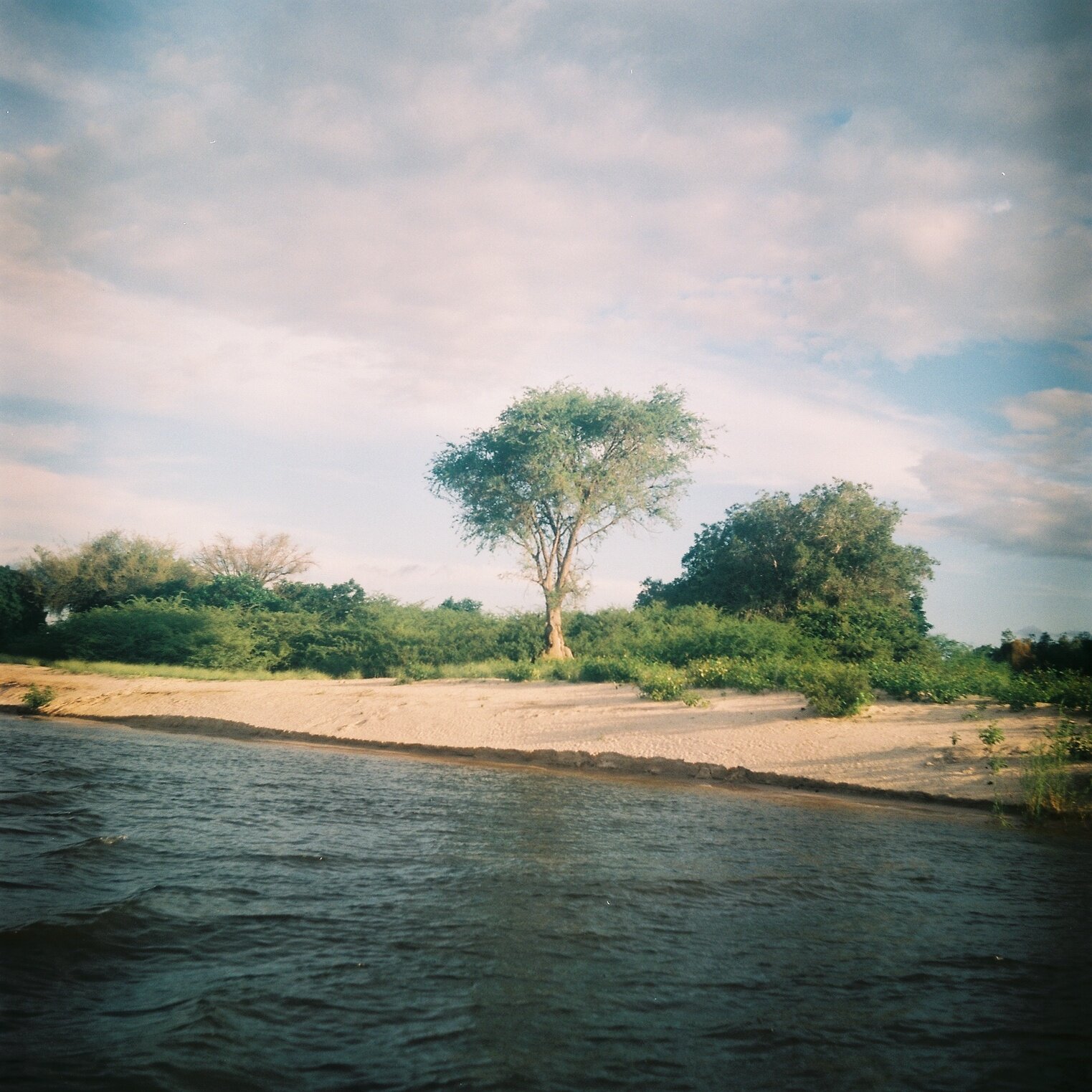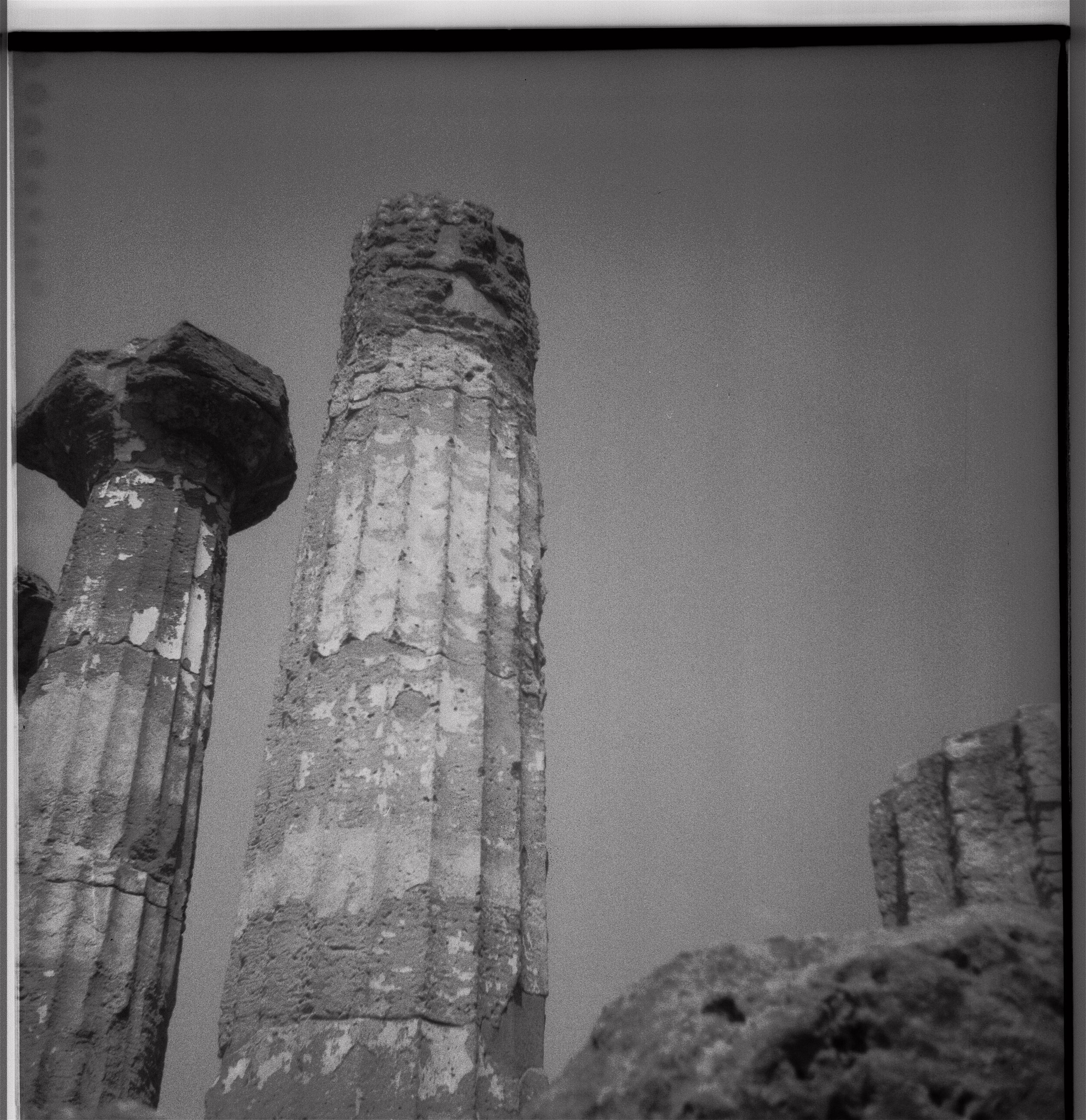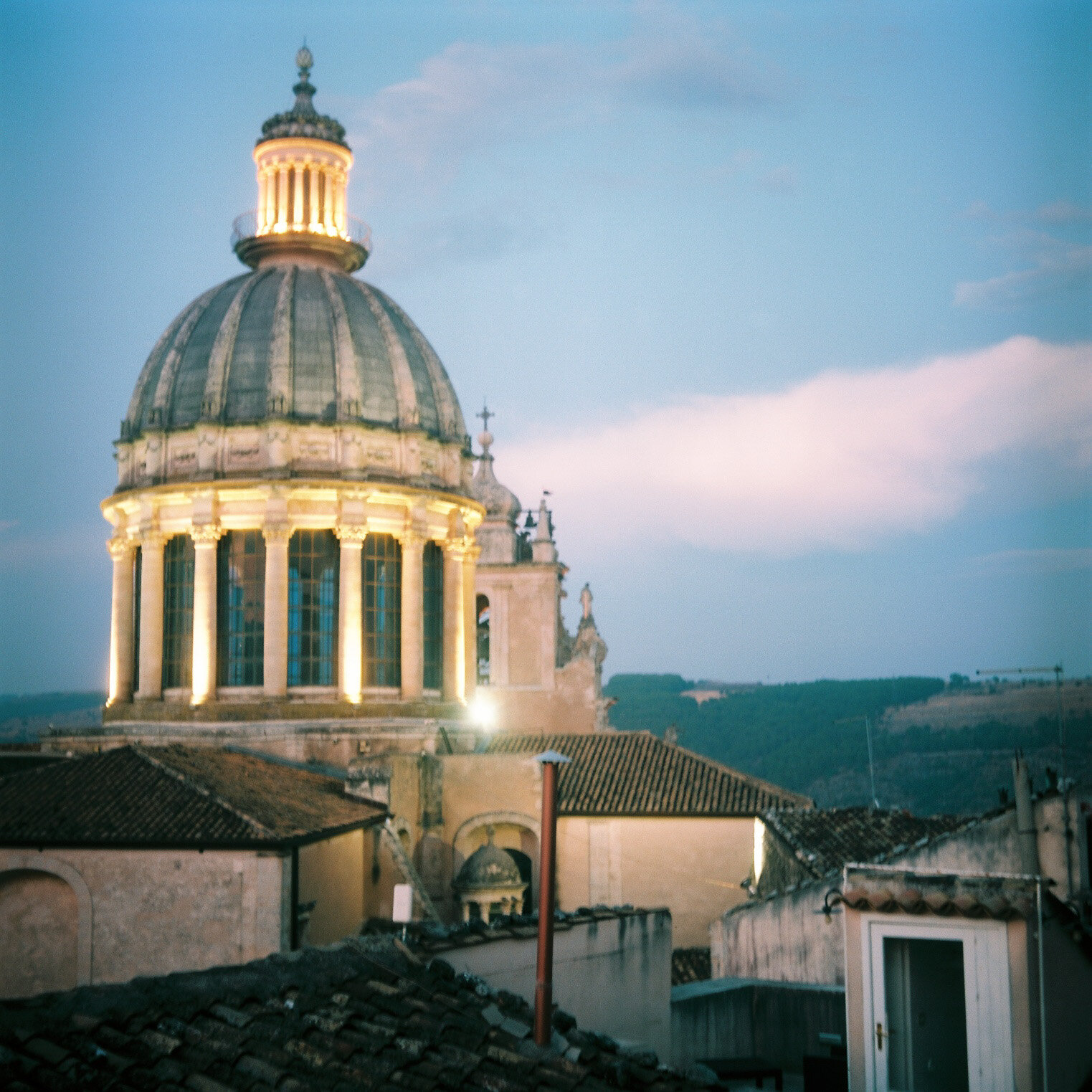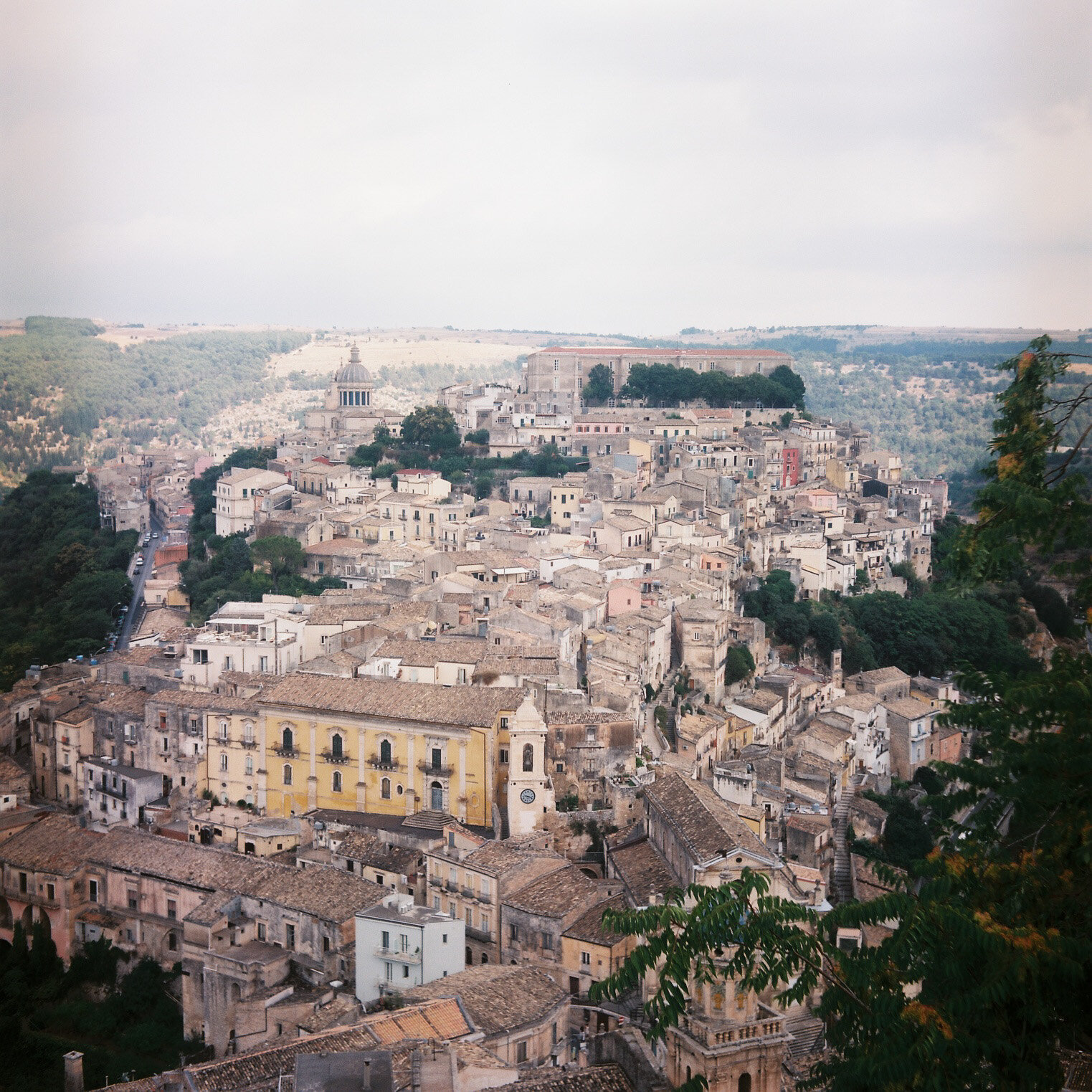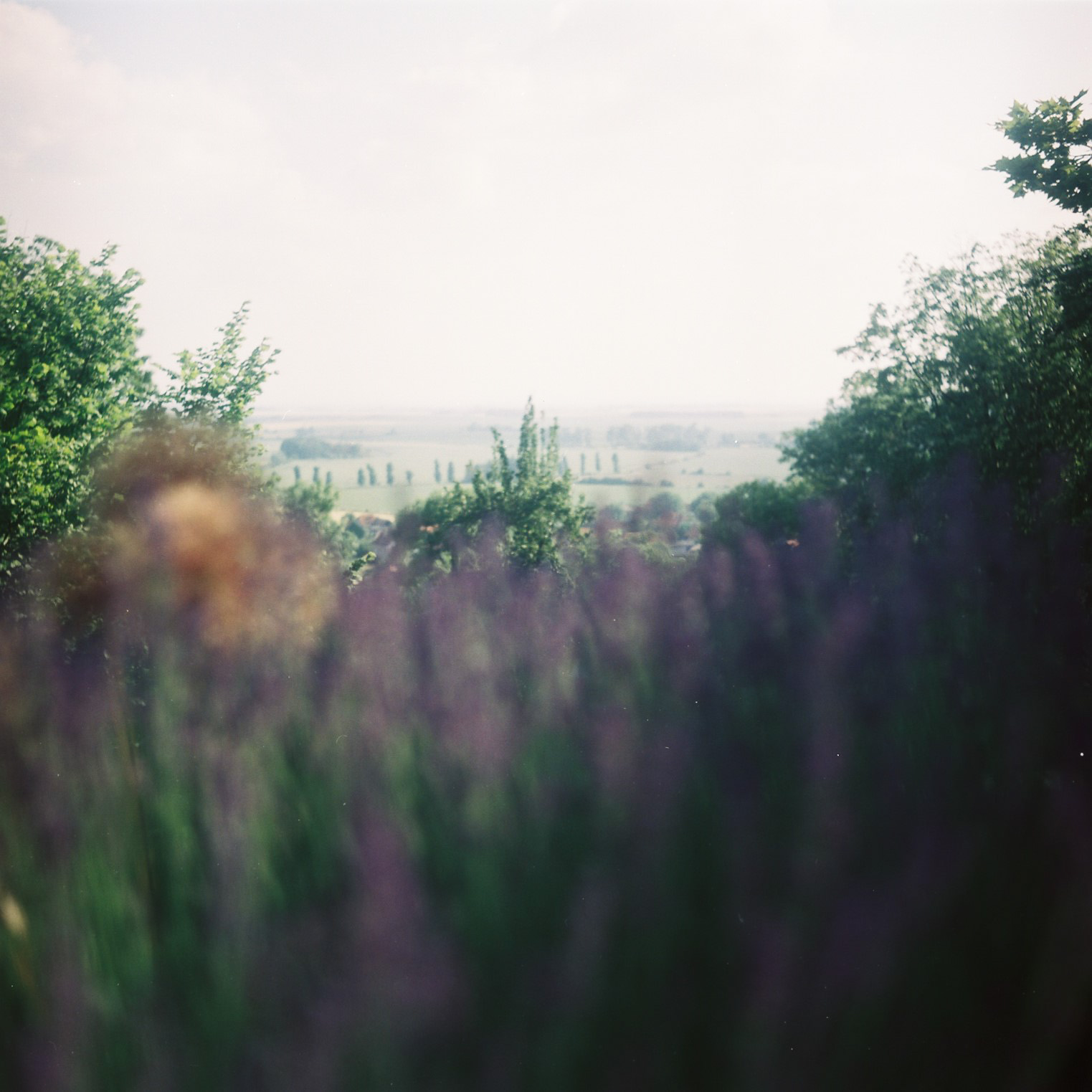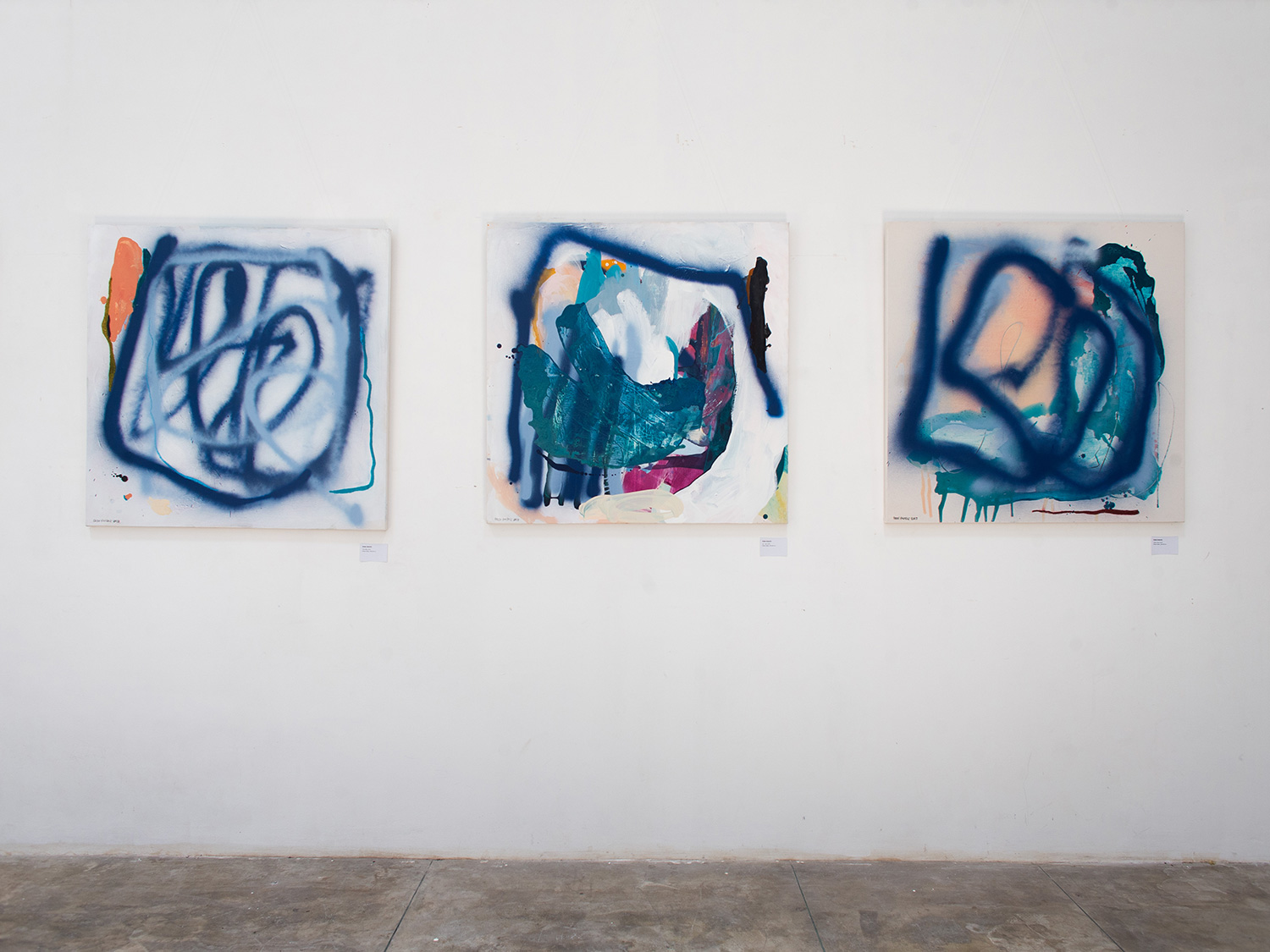Italy and Provence on film
Film photographs from Europe
“The idea is there locked inside. All you have to do is to remove the excess stone.” Michelangelo
Artist Residency | Provence | France
Artist Residency in Provence, France, near historical town Uzès, in a charmy silent village La Bruguière, at magical Mas D’Augustine, which I felt privileged and grateful to create in, provided for my work and creative process great freedom and allowed me to sense different kind of perspective not only to my work. The outdoor working during the last summer warm weather served for a quick flexible approach to my poured, dripped, splattered and scattered splashes of various, inspired by Provencal surroundings, colors, which I was finding in the leaves and grass on the ground, observing the color palette of stone houses around and taking them back in my memory to my temporary outdoor studio at Mas D’Augustine. The work needed to be done quickly as the sun was still strong in these mediterranean areas and the canvas was drying rapidly. There was no time left to spend the contemplation above the works which got my approach into a constant flow of creating. The time got irrelevant and the gap in between thoughts got wider and wider. But not in its physical linear term but in alignment with the creative flow regardless of anything physically evident. It was felt like the infinite space of creative flow opened up not only in that present moment, but all regardless of time and space, made a great sense. The consideration was not there, even in terms of brought materials from my home studio in Prague, the length of the rolled canvas, the randomly chosen colors I decided to paint for this project, the painted works for particular room in the house, all clicked altogether as if there was a universal law that led everything into final all-clicked result. I usually do not think about the process much, I would even say that not at all, and this time was not an exception, and all, everything that happened even on the way, showed up as an amazing evidence how all is connected, even regardless of time and space, and how surrendering to creative flow of all the movement in the Universe (lets say on macrocosmic or microcosmic scale, both mirroring each other) operates in alignment of all that is on the background some so-called divine law. Receiving this truth and tapping into its reality showed itself to be the key.
I would like to thank the owners of Mas D’Augustine for the amazing caring atmosphere they created in their beautiful accommodation that felt like home and where I could create freely. I would like to thank them as well for their generosity in supporting my work and my journey. Thank you Tom and Catherine, it was a pleasure for me to create for you.
With love..
Art exhibition Not of the mind | Prague | until September 30
I am pleased to invite you to exhibition Not of the mind that is taking place at industrial gallery space Stara cistirna odpadnich vod, Bubenec in Prague. The exhibition will last until September 30 and it provides the space for my most recent abstract paintings which were created at historically significant Nerudova street in Prague and which concern the act of going beyond.
“The act of going beyond what is usually known and thought either in perceptions or creations can be understood, as Ordo Amoris reflects, as an invitation to a space that the mind would name “the miracles”. Devoid of all that makes us feel comfortable in the familiar, the space of freedom occurs where all that is is in a pure unconditional creation. Either to create it or to perceive it, by ignoring the habitual responses or unconscious thoughts, Ordo Amoris creates the frequency of being where there is the clarity of doing in so-called non-doing, where all that is provides the space into the unknown and to a priori freedom. “I study the space where questions and subsequent conversations arise between the universal energies of something considered, as an intention, the primary source of all the movement in the Universe, and on the other hand the freedom as the energy a priori inherent in all that is.” What is to go on the canvas, she reflects, is not a picture, nor an idea, not the event, but that “what is”. “I do not have tendencies to name my work abstract. The works without conceptions are not my projections, nor expressions, it has nothing to do with myself, nor my feelings. It is not self-projected, the self is not even there. It is something beyond all experiencing as we know it.” The work, with its ethereal organic forms that are not conditioned yet are not automatic arising from subconscious, are rather a fluent transcendence of all that is, even itself. Being metaphysical in scope it can serve as a juxtaposition between that which we are conditioned to know and to think and that which comes from a priori freedom. Is it not, then, the dissolved self in all that is without its hints or tendencies and freely moving in a gap in between thoughts, the truest essence of its own? The question is not here to be answered. Ordo Amoris believes that "in our willingness to step into the unknown, the wisdom of uncertainty, where the freedom from our conditioning lies, we surrender ourselves to the creative mind that orchestrates the dance of the universe.”
Invitation to opening of art exhibition Not of the mind | August 18 | Prague
I am pleased and honoured to invite you all to opening of my exhibition "Not of the mind" that will take place at exquisite industrial gallery space of Stará čistírna odpadních vod Bubeneč
on August 18 from 17:00.
The exhibition will last until September 30 and it will provide the space for my most recent abstract paintings which were created at historically significant Nerudova street in Prague and which concern the act of going beyond.
“The act of going beyond what is usually known and thought either in perceptions or creations can be understood, as Ordo Amoris reflects, as an invitation to a space that the mind would name “the miracles”. Devoid of all that makes us feel comfortable in the familiar, the space of freedom occurs where all that is is in a pure unconditional creation. Either to create it or to perceive it, by ignoring the habitual responses or unconscious thoughts, Ordo Amoris creates the frequency of being where there is the clarity of doing in so-called non-doing, where all that is provides the space into the unknown and to a priori freedom. “I study the space where questions and subsequent conversations arise between the universal energies of something considered, as an intention, the primary source of all the movement in the Universe, and on the other hand the freedom as the energy a priori inherent in all that is.” What is to go on the canvas, she reflects, is not a picture, nor an idea, not the event, but that “what is”. “I do not have tendencies to name my work abstract. The works without conceptions are not my projections, nor expressions, it has nothing to do with myself, nor my feelings. It is not self-projected, the self is not even there. It is something beyond all experiencing as we know it.” The work, with its ethereal organic forms that are not conditioned yet are not automatic arising from subconscious, are rather a fluent transcendence of all that is, even itself. Being metaphysical in scope it can serve as a juxtaposition between that which we are conditioned to know and to think and that which comes from a priori freedom. Is it not, then, the dissolved self in all that is without its hints or tendencies and freely moving in a gap in between thoughts, the truest essence of its own? The question is not here to be answered. Ordo Amoris believes that "in our willingness to step into the unknown, the wisdom of uncertainty, where the freedom from our conditioning lies, we surrender ourselves to the creative mind that orchestrates the dance of the universe.”
With the team of gallery space I look forward to seeing you and your friends on Tuesday, August 18, from 17:00, at Papírenská 6, Prague 6 - Bubeneč.
Reverie of artist..
..the dawn mist glowing, the water flowing, endless river, forever and ever.
When dark meets light | film photography from Bali, Thailand and Africa
..when the night meets with dawn, dark with light, ignorance with love..and the plant deep from its roots grows and the flower blooms, and they touch again each other and understand.
Letters to a young poet
Read as little as possible..
..in the way of aesthetics and criticism - it will either be partisan views, fossilised and made meaningless in its lifeless rigidity, or it will be neat wordplay, where one opinion will triumph one day and the opposite the next. Works of art are infinitely solitary and nothing is less likely to reach them than criticism. Only love can grasp them and hold them and do them justice. With regard to any such disquisition, review or introduction, trust yourself and your instincts; even if you go wrong in your judgement, the natural growth of your inner life will gradually, over time, lead you to other insights. Allow your verdicts their own quiet untroubled development which like all progress must come from deep within and cannot be forced or accelerated. Everything must be carried to term before it is born. To let every impression and the germ of every feeling come to completion inside, in the dark, in the unsayable, the unconscious, in what is unattainable to ones own intellect, and to wait with deep humility and patience for the hour when a new clarity is delivered: that alone is to live as an artist, in the understanding and in ones creative work. These things cannot be measured by time, a year has no meaning, and ten years are nothing. To be an artist means: not to calculate and count; to grow and ripen like a tree which does not hurry the flow of its sap and stands at ease in the spring games without fearing that no summer may follow. It will come. But it comes only to those who are patient, who are simply there in their vast, quiet tranquility, as if eternity lay before them. It is a lesson I learn every day amid hardships I am thankful for: patience is all..
Rainer Maria Rilke, Letters To a Young Poet
Simplest, yet the greatest
Simplest, yet the greatest..
In this torn desert world there is no love because pleasure and desire play the greatest roles, yet without love your daily life has no meaning. And you cannot have love if there is no beauty. Beauty is not something you see—not a beautiful tree, a beautiful picture, a beautiful building, or a beautiful woman. There is beauty only when your heart and mind know what love is. Without love and that sense of beauty there is no virtue, and you know very well that, do what you will—improve society, feed the poor—you will only be creating more mischief, for without love there is only ugliness and poverty in your own heart and mind. But when there is love and beauty, whatever you do is right, whatever you do is in order. If you know how to love, then you can do what you like because it will solve all other problems. So we reach the point: Can the mind come upon love without discipline, without thought, without enforcement, without any book, any teacher or leader—come upon it as one comes upon a lovely sunset? It seems to me that one thing is absolutely necessary and that is passion without motive—passion that is not the result of some commitment or attachment, passion that is not lust. A man who does not know what passion is will never know love because love can come into being only when there is total self-abandonment. A mind that is seeking is not a passionate mind and to come upon love without seeking it is the only way to find it—to come upon it unknowingly and not as the result of any effort or experience. Such a love, you will find, is not of time; such a love is both personal and impersonal, is both the one and the many. Like a flower that has perfume, you can smell it or pass it by. That flower is for everybody and for the one who takes trouble to breathe it deeply and look at it with delight. Whether one is very near in the garden or very far away, it is the same to the flower because it is full of that perfume and, therefore, it is sharing with everybody. Love is something that is new, fresh, alive. It has no yesterday and no tomorrow. It is beyond the turmoil of thought. It is only the innocent mind which knows what love is, and the innocent mind can live in the world, which is not innocent. To find this extraordinary thing which man has sought endlessly through sacrifice, through worship, through relationship, through sex, through every form of pleasure and pain, is only possible when thought comes to understand itself and comes naturally to an end. Then love has no opposite, then love has no conflict.
Sicilian poem on film
So we are asking, is freedom - not from something - is it love? And is love a reaction? That is, I see a beautiful woman or a man, or a marvellous statue - I'd love to have it, I'd love to have it in my room, look at it day after day, and each time I look at it, it is different, that's a great masterpiece. And for most of us love perhaps may not exist. Please, I am just asking this, I am not saying it does not exist. For most of us perhaps we don't know what it is. We know attraction, we know tenderness, we know pity, we know guilt, remorse and jealousy. The crows are making an awful lot of noise - I am sorry. Is all that love? Do you understand my question? If it is not love, then love has no reaction. Then that is freedom, which is not born out of a reaction. You may be a Christian, and being intellectual you might become a Buddhist. You have chosen, you are free to become a Buddhist, because Buddhism is much more intellectually active, interesting, it has got great depth and all the rest of it. And you are free from one and trapped in the other. And you may love the Buddha, rejecting your own particular deity. And this is called freedom. The crows are free! (Laughter) This is very important to understand, not intellectually, not verbally, but the depth and the beauty of it.
And we also should ask when we are talking about the art of living, what is beauty. The great architecture, the cathedrals of Europe, the great temples and the mosques of the world, constructed with great architects, the great painters, the great sculptors - Michelangelo - ah! When you see all that, that's beautiful. So is beauty manmade? Please exercise your brains to find out. A tiger is not manmade. Thank the lord! A tree in a field alone, solitary, with all the dignity of a marvellous old tree - that's not manmade. But the moment you paint that tree it's manmade, and you admire, go to a museum to see that tree painted by a great artist. So in our life, which is part of the art of living, is to understand the depth and the beauty of freedom, and the goodness of it. And beauty - not the picture, the poem, the marvellous writer - but what is beauty? A beautiful man, a beautiful woman, a face that has depth. And without that aesthetic quality in life, which is born of sensitivity, which is born out of all the senses in action, not one particular, or two, or three senses, but the whole movement of the senses. Surely beauty is when the self is not. When I am not, beauty is. When the self is not, love is. And so love, freedom, goodness, beauty, are one. Not something separate, not something pursued, one pursues what is beauty and spends the rest of your life on that. But they are all interrelated. Goodness, that word, though it is very old fashioned, that very word has an extraordinary depth to that word. To feel the depth of goodness, and that can only be when there is freedom, when there is love, beauty.
Jiddu Krishnamurti
On beauty..
There is still another aspect under which the beauty of the world may be viewed, namely, as it becomes an object of the intellect. Beside the relation of things to virtue, they have a relation to thought. The intellect searches out the absolute order of things as they stand in the mind of God, and without the colors of affection. The intellectual and the active powers seem to succeed each other, and the exclusive activity of the one generates the exclusive activity of the other. There is something unfriendly in each to the other, but they are like the alternate periods of feeding and working in animals; each prepares and will be followed by the other. Therefore does beauty, which, in relation to actions, as we have seen, comes unsought, and comes because it is unsought, remain for the apprehension and pursuit of the intellect; and then again, in its turn, of the active power. Nothing divine dies. All good is eternally reproductive. The beauty of nature reforms itself in the mind, and not for barren contemplation, but for new creation. All men are in some degree impressed by the face of the world; some men even to delight. This love of beauty is Taste. Others have the same love in such excess, that, not content with admiring, they seek to embody it in new forms. The creation of beauty is Art. The production of a work of art throws a light upon the mystery of humanity. A work of art is an abstract or epitome of the world. It is the result or expression of nature, in miniature. For, although the works of nature are innumerable and all different, the result or the expression of them all is similar and single. Nature is a sea of forms radically alike and even unique. A leaf, a sun-beam, a landscape, the ocean, make an analogous impression on the mind. What is common to them all,—that perfectness and harmony, is beauty. The standard of beauty is the entire circuit of natural forms,—the totality of nature; which the Italians expressed by defining beauty "il piu nell' uno." Nothing is quite beautiful alone: nothing but is beautiful in the whole. A single object is only so far beautiful as it suggests this universal grace. The poet, the painter, the sculptor, the musician, the architect, seek each to concentrate this radiance of the world on one point, and each in his several work to satisfy the love of beauty which stimulates him to produce. Thus is Art, a nature passed through the alembic of man. Thus in art, does nature work through the will of a man filled with the beauty of her first works. The world thus exists to the soul to satisfy the desire of beauty. This element I call an ultimate end. No reason can be asked or given why the soul seeks beauty. Beauty, in its largest and profoundest sense, is one expression for the universe. God is the all-fair. Truth, and goodness, and beauty, are but different faces of the same All. But beauty in nature is not ultimate. It is the herald of inward and eternal beauty, and is not alone a solid and satisfactory good. It must stand as a part, and not as yet the last or highest expression of the final cause of Nature.
Ralph Waldo Emerson, Nature
Silence..
The only silence we know is the silence when noise stops, the silence when thought stops - but that is not silence. Silence is something entirely different, like beauty, like love. And this silence is not the product of a quiet mind, it is not the product of the brain cells which have understood the whole structure and say, `For God's sake be quiet; then the brain cells themselves produce the silence and that is not silence. Nor is silence the outcome of attention in which the observer is the observed; then there is no friction, but that is not silence. You are waiting for me to describe what this silence is so that you can compare it, interpret it, carry it away and bury it. It cannot be described. What can be described is the known, and the freedom from the known can come into being only when there is a dying every day to the known, to the hurts, the flatteries, to all the images you have made, to all your experiences - dying every day so that the brain cells themselves become fresh, young, innocent. But that innocency, that freshness, that quality of tenderness and gentleness, does not produce love; it is not the quality of beauty or silence. That silence which is not the silence of the ending of noise is only a small beginning. It is like going through a small hole to an enormous, wide, expansive ocean, to an immeasurable, timeless state. But this you cannot understand verbally unless you have understood the whole structure of consciousness and the meaning of pleasure, sorrow and despair, and the brain cells themselves have become quiet. Then perhaps you may come upon that mystery which nobody can reveal to you and nothing can destroy. A living mind is a still mind, a living mind is a mind that has no centre and therefore no space and time. Such a mind is limitless and that is the only truth, that is the only reality.
Jiddu Krishnamurti
Unseen
..truth is a pathless land
Eternal movement
Meditation is not a search, it's not a seeking, a probing, an exploration. It is an explosion and discovery. It's not the taming of the brain to conform nor is it a self-introspective analysis, it is certainly not the training in concentration which includes, chooses and denies. It's something that comes naturally, when all positive and negative assertions and accomplishments have been understood and drop away easily. It is the total emptiness of the brain. It's the emptiness that is essential, not what's in the emptiness, there is seeing only from emptiness, all virtue, not social morality and respectability, springs from it. It's out of this emptiness love comes, otherwise it's not love. Foundation of righteousness is in this emptiness. It's the end and beginning of all things.
These magical works on photography are created with Flexaret camera on Kodak film, Portra 160, 120mm.
Exhibition wu-wei | Bali
...at the still point of the turning world, there the dance is, but neither arrest nor movement. And do not call it fixity, where past and future are gathered. Neither movement from nor towards, neither ascent nor decline. Except for the point, the still point, there would be no dance, and there is only the dance.
T. S. Eliot
When wu-wei is done, nothing is left undone..
The works I created for this exhibition represent nothing and yet they represent the most essential truth. The truth which is not possible to know, nor to describe, neither to think about it.
The exhibition with my new artworks along with meditative works of Stepan Vrzala was possible to see in unique gallery space Workshopbali in Ubud, Bali until April 5th 2019.
Total freedom
To me, there is a reality, an immense living truth, and to comprehend that, there must be utter simplicity of thought. There is a great subtlety, an infinite subtlety and delicacy, and if you use words merely as a means of getting to that delicacy, to that simplicity of thought, then I am afraid you will not comprehend what I want to convey. But if you would use the significance of words as a bridge to cross, then words will not become an illusion in which the mind is lost. I say there is this living reality, call it God, truth, or what you like, and it cannot be found or realised through search. Where there is the implication of search there must be contrast and duality, whenever mind is seeking, it must inevitably imply a division, a distinction, a contrast, which does not mean that mind must be contented, mind must be stagnant. There is that delicate poise, which is neither contentment, nor this ceaseless effort born of search, of this desire to attain, to achieve, and in that delicacy of poise lies simplicity, not the simplicity of having but few clothes or few possessions. I am not talking of such simplicity, which is merely a crude form, but of simplicity born of this delicacy of thought, in which there is neither search nor contentment.
As I said, search implies duality, contrast. Now where there is contrast, duality, there must be identification with one of the opposites, and from this there arises compulsion. When we say we search, our mind is rejecting something and seeking a substitute that will satisfy it, and thereby it creates duality, and from this there arises compulsion. That is, the choice of the one is the overcoming of the other, isn't it?
When we say we seek out or cultivate a new value, it is but the overcoming of that in which the mind is already caught up, which is its opposite. This choice is based on attraction to one or fear of the other, and this clinging through attraction, or rejection through fear, creates influence over the mind. Influence then is the negation of understanding and can exist only where there is division, the psychological division from which there arise distinctions such as class, nationality, religious, sex. That is, when the mind is trying to overcome, it must create duality, and that very duality negates understanding and creates the distinctions. That duality influences the mind, and hence a mind influenced by duality cannot understand the significance of environment or the significance of the cause of conflict. These psychological influences are merely reactions to environment from that centre of "I" consciousness, of like and dislike, of antitheses, and naturally where there are antitheses, opposites, there can be no comprehension. From this distinction there arises the classification of influences as beneficial and evil. So as long as mind is influenced - and influence is born of attraction, opposites, antitheses - there must be the domination or compulsion of love, of intellect, of society, and this influence must be a hindrance to that understanding which is beauty, truth, and love itself.
Now, if you can become aware of this influence, then you can discern its cause. Most people seem to be aware superficially, not at the greatest depth. It is only when there is awareness at the greatest depth of consciousness, of thought and emotion, that you can discern the division that is created through influence, which negates understanding.
Jiddu Krishnamurti
Creativity
What we call happiness or ecstasy is, to me, creative thinking. And creative thinking is the infinite movement of thought, emotion and action. That is, when thought, which is emotion, which is action itself, is unimpeded in its movement, is not compelled or influenced or bound by an idea, and does not proceed from the background of tradition or habit, then that movement is creative. So long as thought - and I won't repeat each time emotion and action - so long as thought is circumscribed, held by a fixed idea, or merely adjusts itself to a background or condition and, therefore, becomes limited, such though is not creative. So the question which every thoughtful person puts to himself is how can he awaken this creative thinking, because when there is this creative thinking, which is infinite movement, then there can be no idea of a limitation, a conflict. Now this movement of creative thinking does not seek in its expression a result, an achievement, its results and expressions are not its culmination. Is has no culmination or goal, for it is eternally in movement. Most minds are seeking a culmination, a goal, an achievement, and are holding themselves upon the idea of success, and such thought, such thinking is continually limiting itself, whereas if there is no idea of achievement but only the continual movement of thought as understanding, as intelligence, then that movement of thought is creative. That is, creative thinking ceases when mind is crippled by adjustment through influence, or when it functions with the background of a tradition which it has not understood, or from a fixed point, like an animal tied to a post. So long as this limitation, this adjustment, exists, there cannot be creative thinking, intelligence, which alone is freedom.
This creative movement of thought never seeks a result or comes to a culmination, because result or culmination is always the outcome of alternate cessation and movement, whereas if there is no search for a result, but only continual movement of thought, then that is creative thinking.
Again, creative thinking is free of division, which creates conflict between thought, emotion, and action. And division exists only when there is the search of a goal, when there is adjustment and the complacency of certainty.
Action is this movement which is itself thought and emotion, as I explained. This action is the relationship between the individual and society. It is conduct, work, cooperation, which we call fulfilment. That is, when mind is functioning without seeking a culmination, a goal, and, therefore, thinking creatively, that thinking is action which is the relationship between the individual and society. Now if this movement of thought is clear, simple, direct, spontaneous, profound, then there is no conflict in the individual against society, for action then is the very expression of this living, creative movement.
So to me there is no art of thinking, there is only creative thinking. There is no technique of thinking, but only spontaneous creative functioning of intelligence, which is the harmony of reason, emotion, and action, not divided or divorced from each other.
Now this thinking and feeling, without a search for a reward, a result, is true experiment, isn't it? In real experiencing, real experimenting, there cannot be the search for result, because this experimenting is the movement of creative thought. To experiment, mind must be continually freeing itself from the environment with which it conflicts in its movement, the environment which we call the past. There can be no creative thinking if mind is hindered by the search for a reward, by the pursuit of a goal.
When the mind and heart are seeking a result or a gain, thereby complacency and stagnation, there must be practice, an overcoming, a discipline, out of which comes conflict. Most people think that by practicing a certain idea they will release creative thinking. Now, practice, if you come to observe it, ponder over it, is nothing but the result of duality. And an action born of this duality must perpetuate that distinction between mind and heart, and such action becomes merely the expression of a calculated, logical, self-protective conclusion. If there is this practice of self-discipline, or this continual domination or influence by circumstances, then practice is merely an alteration, a change toward an end, it is merely action within the confines of the limited thought which you call self - consciousness. So practice does not bring about creative thinking.
To think creatively is to bring about harmony between mind, emotion and action. That is, if you are convinced of an action, without the search of a reward at the end, then that action, being the result of intelligence, releases all hindrances that have been placed on the mind through the lack of understanding.
Where the mind and heart are held by fear, by lack of understanding, by compulsion, such a mind, though it can think within the confines, within the limitations of that fear, is not really thinking, and its action must ever throw up new barriers. Therefore, its capacity to think is ever being limited. But if the mind frees itself through the understanding of circumstances and, therefore, acts, then that very action is creative thinking.
Jiddu Krishnamurti
Mind
You see, we have made of truth something permanent. And is truth permanent? If it is, then it is within the field of time. To say that something is permanent implies that it is continuous; and what is continuous is not truth. That is the beauty of truth: it must be discovered from moment to moment, not remembered. A remembered truth is a dead thing. Truth must be discovered from moment to moment because it is living, it is never the same; and yet each time you discover it, it is the same. What is important is not to make a theory of truth, not to say that truth is permanent in us and all the rest of it - that is an invention of the old who are frightened both of death and of life. These marvellous theories - that truth is permanent, that you need not be afraid because you are an immortal soul, and so on - have been invented by frightened people whose minds are decaying and whose philosophies have no validity. The fact is that truth is life, and life has no permanency. Life has to be discovered from moment to moment, from day to day; it has to be discovered, it cannot be taken for granted. If you take it for granted that you know life, you are not living. Three meals a day, clothing, shelter, sex, your job, your amusement and your thinking process - that dull, repetitive process is not life. Life is something to be discovered; and you cannot discover it if you have not lost, if you have not put aside the things that you have found. Do experiment with what I am saying. Put aside your philosophies, your religions, your customs, your racial taboos and all the rest of it, for they are not life. If you are caught in those things you will never discover life; and the function of education, surely, is to help you to discover life all the time. A man who says he knows is already dead. But the man who thinks, "I don't know", who is discovering, finding out, who is not seeking an end, not thinking in terms of arriving or becoming - such a man is living, and that living is truth.
Jiddu Krishnamurti




